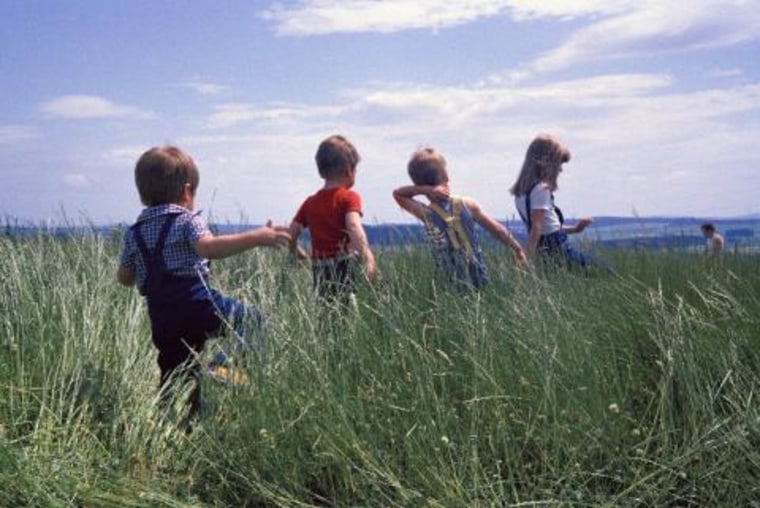Parental favoritism, a popular topic in literature, movies and in psychotherapists’ offices, has recently been receiving attention in the media. And the perception that “Mom always loved you best” — as 1960s comedian Tom Smothers would tell his brother — can have an impact on a person’s self-esteem and sense of self-worth. From the Biblical story of Rebecca helping her favorite child, Jacob, steal his birthright from his brother, Esau, to Cinderella and even Harry Potter, stories of parents and parental substitutes giving preferential treatment to one child have captured our imaginations and, sometimes, our hearts.
It is then, perhaps, unsurprising that actress Jaime Pressly (of the sitcom “Mom”) ignited an internet firestorm with a recent Instagram post of herself with her 12-year-old son captioned: “Best time ever hangin with my favorite son, Dezi.”
Pressly’s next words indicate that she expected some criticism: “That's right I said it. I have a favorite son although I luv all 3 of my boys with everything I have in me. Dez and I have a special bond that no one else will ever match because we've grown up together."
The thing is, though, that a 2005 study confirmed that favoritism is a normal part of parenting. “Parents are often in denial about favoritism because it contradicts their” idealized image of who they are as parents, Joan Kavanaugh, a psychotherapist, author and founder of the Counseling Center at New York City's Riverside Church, told me.
And, in the best of cases — according to both research and anecdotal evidence from my own clients and psychotherapists I supervise and teach — a good imperfect parent will have different favorites over the course of a day, a week or even a year. When your adorable toddler suddenly morphs into a tantrum-throwing rebel, you might suddenly find your previous irritation with your independent 5-year-old disappearing. And that’s just fine, especially if the balance shifts again at some future point.
Yet the reality of favoritism is a bit confusing for children, especially as they age. While a recent article in The Guardian talks about the genuine emotional pain of being your parents’ “least favored child,” there are other factors to be considered.
Being a favorite or being the least-favored child in a family can affect a person’s ability to successfully navigate adult relationships and work. For example, one of the central tasks of the college years is to develop a sense of identity — that is, a sense of who you are in the world. Margaret Wood, a social worker and the retired co-director of the counseling service at Williams College in Massachusetts, told me, “Where you are in your family is a question that always resonates with college students, as they struggle with the all-important questions about identity and becoming your true self.”
A woman I saw for psychotherapy complained about her younger brother, who she dubbed “The Prince.” Their mother adored this only son and required her daughters to wait on him. “I remember him sitting at the kitchen table and us having to bring him his food, clear it away and wash the dishes, while he did nothing.” This memory became a symbol for an entire lifetime of pain and bitter anger at her mother. But despite this hurtful experience, she was a highly successful professional and proud of her achievements in her field. (Like Harry Potter and Cinderella, many people succeed in life in part because their parents did not favor them.)
It’s also not clear that being preferred is always a good thing for the favorite child. Wood said: “Being the favorite can be loaded — like in those fairy tales where the fairy’s gifts are both a curse and a blessing. Is it constricting and/or is it a source of some sense of being special?” The previously mentioned Guardian story, for instance, recounts how family favorites can struggle to be successful without their parents to smooth the way for them, or learn to fear that, if they aren’t perfect, they’ll end up unfavored like their siblings.
And, the question of which parent gives a child preferential treatment can sometimes be as important as the favoritism itself. One man I worked with knew he was his mother’s pet, but he felt rejected by his father and spent much of his life seeking approval from older men who were father-substitutes.
Unfortunately, favoritism can also have a lifetime affect on sibling relationships. Research has shown that parental prejudice can make it hard for siblings to provide support for one another through adult life crises. A recent New York Times article about media mogul Rupert Murdoch and his two sons highlights some of the ways that parents can promote rivalry rather than mutual support among their adult children
That said, recognizing that favoritism does exist can be freeing for everyone. When preferential treatment is extreme, the knowledge that it’s real and that it comes from a parent’s own psychological damage can help a child begin to separate themselves from parental valuation and start to find other people in the world to give more realistic feedback about who they are and what they’re worth. And when favoritism fluctuates in a normal, healthy (albeit potentially difficult) way, it can be just one of the many ways that family relationships help us build the emotional and psychological muscles for living in the real world — where favoritism and preferential treatment is part of life.


